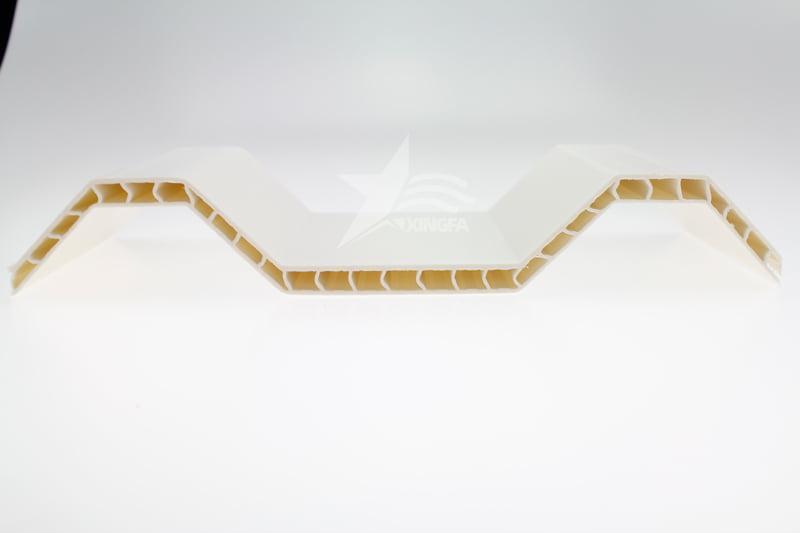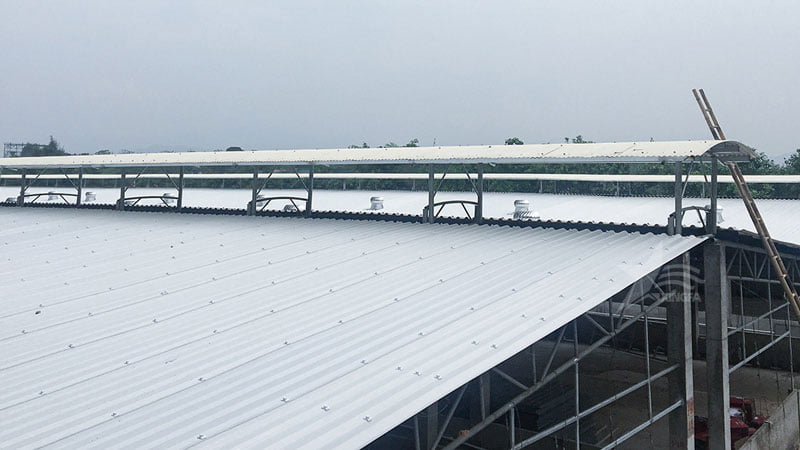PVC hollow roof sheets, often referred to as “thermal insulation artifacts,” are increasingly popular for factory roofs due to their excellent thermal insulation properties, durability, and cost-effectiveness. Here’s an in-depth look at what they are, their benefits, and considerations for installation:

What are PVC Hollow Roof Sheets?

PVC hollow roof sheets are made from polyvinyl chloride (PVC) and designed with a hollow structure, which enhances their thermal insulation capabilities. The sheets consist of two layers with an air gap in between, reducing heat transfer and providing effective insulation.
Benefits of PVC Hollow Roof Sheets
- Thermal Insulation
– The hollow structure significantly reduces heat transmission, helping maintain a cooler interior in hot climates and retaining warmth in colder conditions. This makes them ideal for factory roofs where temperature regulation is crucial.
- Durabilidad
– PVC is resistant to corrosion, chemicals, and UV radiation. This ensures a long lifespan, even in harsh industrial environments.
- Lightweight
– The hollow design makes these sheets lighter than solid roofing materials, easing transportation and installation.
- Cost-Effective
– Lower material and installation costs compared to traditional roofing materials like metal or concrete. They also reduce energy costs due to their insulating properties.
- Fire Resistance
– PVC has inherent fire-resistant properties, adding a layer of safety to industrial buildings.
- Sound Insulation
– The air gap within the sheets also helps in reducing noise levels, which is beneficial for noisy industrial settings.
- Easy Installation and Maintenance
– PVC hollow roof sheets are easy to handle, cut, and install. They require minimal maintenance compared to other roofing materials.
Considerations for Installation
- Structural Support
– Ensure the existing roof structure can support the new roofing material. PVC sheets are lightweight, but proper support and secure installation are crucial.
- Compatibility
– Check for compatibility with other building materials and systems, such as drainage and ventilation systems.
- Weather Conditions
– Consider local weather patterns. While PVC is durable, extremely heavy snow loads or high winds might require additional support or specific installation techniques.
- Quality and Certification
– Choose high-quality, certified PVC sheets from reputable manufacturers to ensure longevity and performance.
- Professional Installation
– While PVC sheets are easier to install than some materials, professional installation ensures proper fitting, sealing, and adherence to safety standards.
Leading Manufacturers and Suppliers
- Palram: Known for producing a variety of PVC roofing solutions with excellent thermal insulation properties.
- Onduline: Offers a range of lightweight and durable PVC roofing sheets suitable for industrial applications.
- A&C Plastics: Provides high-quality PVC roofing sheets with a focus on thermal insulation and durability.
- Tuflite: Specializes in advanced polymer roofing solutions, including PVC hollow roof sheets designed for industrial use.

Conclusion
Hollow pvc panel are an excellent choice for factory roofs, providing superior thermal insulation, durability, and cost-effectiveness. By considering factors like structural support, compatibility, and professional installation, you can ensure a successful and efficient roofing solution that enhances the overall performance and comfort of your industrial building.
